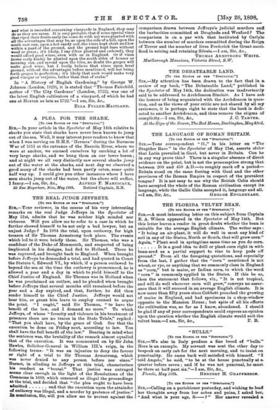THE REAL JUDGE JEFFREYS.
[To THE ED/TOZ OF TEM " SPECTATOR:] Sliti—Your reviewer, in the course of his very interesting remarks on the real Judge Jeffreys in the Spectator of May 21st, admits that he was neither high minded nor virtuous. Will you allow me to refer to a case in which he further showed himself to be not only a bad lawyer, but an unjust Judge ? In 1684 the trial, upon outlawry, for high treason of Sir Thomas Armstrong took place. The events which led to it were briefly these. Sir Thomas, who was a confidant of the Duke of Monmouth, and suspected of being implicated in his designs, had fled to Holland. There he was captured, and brought back to England. When brought before Jeffreys he demanded a trial, and had quoted in Court the Statute 6, Edward VI., by which, if a person outlawed be beyond the sea at the time the outlawry is pronounced, he is allowed a year and a day in which to yield himself to the Chief Justice of England. Sir Thomas was in Holland when he was proclaimed an outlaw, and he pleaded when brought before Jeffreys that several months still remained before the year and a day expired, and that, further, he did then render himself to the Chief Justice. Jeffreys would not hear him, or grant him leave to employ counsel to argue the point. "I ought," said Sir Thomas, "to have the benefit of the law, and I demand no more." To which Jeffreys, of whose "ferocity and violence in his treatment of prisoners there are no traces in the State Trials," replied : "That you shall have, by the grace of God. See that the execution be done on Friday next, according to law. You shall have the fall benefit of the law." Bearing in mind what the sentence was, the brutality of the remark almost equalled that of the execution. It was commented on by Sir John Hawles, Solicitor-General in William M.'s reign, in the following terms : "It was an injustice to deny the favour or right of a trial to Sir Thomas Armstrong, which was never denied to any person before nor since." Burnet, in alluding to Jeffreys at this trial, characterises his conduct as "brutal." That justice was outraged seems clear enough in the light of the Resolutions of the Commons in 1689, which censured as illegal the proceedings at the trial, and decided that "the plea ought to have been
admitted and that the execution upon the attainder of outlawry was illegal, and a murder by pretence of justice." In conclusion, Sir, will you allow me to protest against the
comparison drawn between Jeffreys's judicial murders and the barbarities committed at Drogheda and Wexford? The comparison is on a par with that instituted by Carlyle between the number of murders committed during the Reign of Terror and the number of lives Frederick the Great sacri- ficed in seizing and retaining Sileaia.—I am, Sir, Sic., THOMAS ARMSTRONG WHITE.
Marlborough Mansions, Victoria Street, S. W.


































 Previous page
Previous page